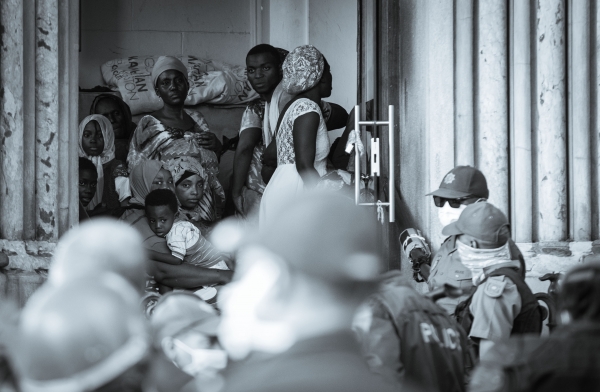COVID-19 exacerbates anti-immigrant prejudice and discrimination

Police evict refugees from the Central Methodist Mission Church on Greenmarket Square after a five-month long occupation.
Photo: Ashraf Hendricks/GroundUp
Mass demonstrations against systemic racism have broken out across the world in reaction to the unjust and tragic death of George Floyd at the hands of police in the United States. This outpouring of cross-national solidarity with the African American community has prompted calls for greater self-reflection on anti-black violence. Many South Africans - including members of national government - have voiced support for the protesters, the Black Lives Movement, and expressed their desire for systematic reform in America. However, their silence about the prejudice and discrimination faced by foreigners living in South Africa is worrying. We need to push back against such bigotry and intolerance, writes Steven Gordon.
A number of public figures have criticised those who champion the #BlackLivesMatter cause – but remain silent about the prejudice and discrimination faced by foreigners living in South Africa. For instance, Economic Freedom Fighter leader Julius Malema has attacked the use of the Twitter hashtag #PutSouthAfricaFirst, claiming that it speaks to a narrow nationalism. Local artists like Pearl Thusi and Deko Barbara-Jessica Wedi have raised similar concerns, denouncing the prevalence of anti-immigrant attitudes in South African society.
In South Africa, foreigners, especially those of African origin, are often denied access to government services. This kind of prejudice frequently occurs despite legal protections and the efforts of pro-immigrant non-profit groups. During the current COVID-19 pandemic, we are seeing this pattern repeat itself with vulnerable migrants denied access to government relief programmes as well as essential health care. Rights to testing, contact tracing and medical treatment are essential for all residents of South Africa.
In addition to the denial of basic care, foreigners often suffer abuse at the hands of local law enforcement. Consider the case of Dr Emmanuel Taban, reportedly pulled over by Tshwane Metro Police officers following a traffic violation, then allegedly manhandled and throttled before being detained.
Some are fighting back against anti-immigrant prejudice in South Africa. For example, thanks to an application by the Scalabrini Centre of Cape Town, the Pretoria High Court has finally compelled the government to give asylum seekers access to the COVID-19 Social Relief of Distress grant. There has been some backlash against the decision to extend government relief funding to vulnerable foreigners. This seems especially common among those who have tried and failed to obtain relief funding from the South African Social Security Agency. One such complainant, Thabo Moremi, told the press that: “[i]t can’t be that we as South Africans are suffering but the foreigners will be getting money and we don’t. Our government and the system seems to care more about foreigners than the citizens who vote for them”. As the country struggles with the economic fallout of the COVID-19 pandemic, this kind of welfare chauvinism seems to be on the rise.
Nations have hardened borders and impeded migration in response to the rapid spread of COVID-19. South Africa is no different, erecting new border fencing and pushing forward on greater cross-border regulation. There is growing concern that when our nation emerges from lockdown, she will be a more isolated, closed and insulated place. A new generation will grow up in a world that is more narrow-minded, fearful and distrusting than it was 20 years ago. Many young people are already divided on the question of whether our nation has a moral obligation to shelter and protect refugees and those seeking asylum.
To understand youth antipathy to vulnerable foreigners, we can look at the Pan-African Youth Survey, which asked 4,200 young adults aged 18–24 years how they viewed Africa and her challenges. Participants were from 14 countries, including South Africa, Togo, Ethiopia and Zimbabwe. A majority of South Africans (59%) felt that refugees and immigrants had a negative impact on the nation. Less than half believed that countries on the continent should set aside their differences and come together to reach common solutions. This response is decidedly more hard-line and nationalist than those observed in other countries like Senegal, Rwanda and Nigeria.
Economic and social conditions in South Africa are likely to worsen over the next few years. The unemployment rate has already hit a record high and we will probably experience the deepest economic contraction of the last century. Resources are scarce, and it is natural during such uncertain times to fear that outsiders will take more than they give. In other parts of the world, such fears have blossomed into prejudice that has undermined social cohesion.
The tragic murder of George Floyd shows us how bigotry can seep deep into the roots of society, transforming into entrenched systems of injustice. There is a need to push back against such bigotry and teach the next generation about the damage caused by this kind of corrosive intolerance. Every child must know and understand that all who live in South Africa have the right to equality and human dignity.
Author: Dr Steven Gordon, a senior research specialist in the HSRC’s Democratic, Capable and Ethical State division
sgordon@hsrc.ac.za
